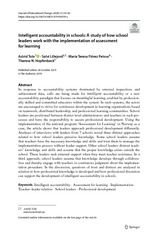| dc.contributor.author | Tolo, Astrid | |
| dc.contributor.author | Lillejord, Sølvi | |
| dc.contributor.author | Flórez Petour, María Teresa | |
| dc.contributor.author | Hopfenbeck, Therese N. | |
| dc.date.accessioned | 2020-08-13T09:23:45Z | |
| dc.date.available | 2020-08-13T09:23:45Z | |
| dc.date.issued | 2020 | |
| dc.Published | Tolo A, Lillejord S, Flórez Petour, Hopfenbeck. Intelligent accountability in schools: A study of how school leaders work with the implementation of assessment for learning. Journal of educational change. 2020;21:59-82 | eng |
| dc.identifier.issn | 1389-2843 | |
| dc.identifier.issn | 1573-1812 | |
| dc.identifier.uri | https://hdl.handle.net/1956/23723 | |
| dc.description.abstract | In response to accountability systems dominated by external inspections and achievement data, calls are being made for intelligent accountability or a new accountability paradigm that focuses on meaningful learning, enabled by professionally skilled and committed educators within the system. In such systems, the actors are encouraged to strive for continuous development in learning organisations based on teamwork, distributed leadership, and professional learning communities. School leaders are positioned between district level administrators and teachers in such processes and have the responsibility to secure professional development. Using the implementation of the national program ‘Assessment for Learning’ in Norway as a case, the article shows that leaders approach professional development differently. Analyses of interviews with leaders from 7 schools reveal three distinct approaches related to how school leaders perceive knowledge. Some school leaders assume that teachers have the necessary knowledge and skills and trust them to manage the implementation process without leader support. Other school leaders distrust teachers’ knowledge and skills and assume that the proper knowledge exists outside the school. These leaders seek external support when they meet teacher resistance. In a third approach, school leaders assume that knowledge develops through collaboration and thereby engage with teachers in continuous judgment about the implementation procedure. In the discussion, questions of trust and distrust are analysed in relation to how professional knowledge is developed and how professional discretion can support the development of intelligent accountability in schools. | en_US |
| dc.language.iso | eng | eng |
| dc.publisher | Springer | eng |
| dc.rights | Attribution CC BY | eng |
| dc.rights.uri | http://creativecommons.org/licenses/by/4.0/ | eng |
| dc.title | Intelligent accountability in schools: A study of how school leaders work with the implementation of assessment for learning | eng |
| dc.type | Peer reviewed | |
| dc.type | Journal article | |
| dc.date.updated | 2020-01-23T09:48:21Z | |
| dc.description.version | publishedVersion | |
| dc.rights.holder | Copyright 2019 The Authors | eng |
| dc.identifier.doi | https://doi.org/10.1007/s10833-019-09359-x | |
| dc.identifier.cristin | 1744319 | |
| dc.source.journal | Journal of educational change | |

